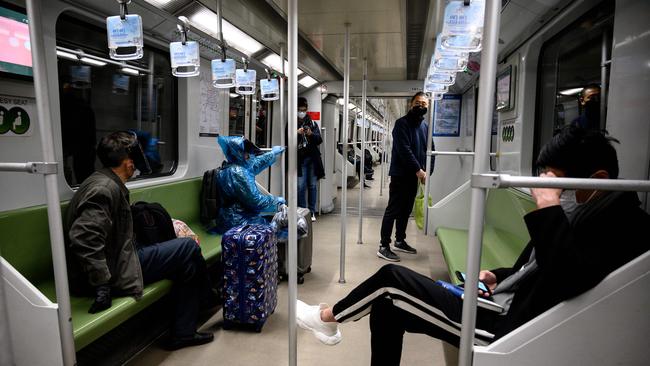Coronavirus has turned Shanghai into a ghost town
After 14 years living in one of the busiest cities in the world, Australian journalist Paul LePetit has seen Shanghai become a ghost town on lock down, waiting for the coronavirus to pass.
Rendezview
Don't miss out on the headlines from Rendezview. Followed categories will be added to My News.
The Spring Festival (Chinese New Year) is always a quieter time in Shanghai as the world’s largest annual human migration takes place.
Millions were expected in Shanghai, where I have lived for the past 14 years, in the first week of February. By then we all knew about the new virus, but it did not seem to pose a huge threat to Shanghai. My expat friends (and some of my Chinese friends) joked about not being safe from it because we hadn’t visited Hubei and we didn’t drink Mexican beer.
But this year was different. The quiet streets began to take on a sinister cast as the Spring Festival holiday came to a close and the millions did not come back to Shanghai.
People stayed glued to news sources as the “holiday” was extended, obediently following the government’s instructions. Shopping centres did not reopen, restaurants stayed closed, and the restrictions became more pervasive and enforced.

The few places that were open welcomed visitors with temperature readers and hand disinfectants. When I went to have a quiet drink at my local pub, the bar manager insisted on taking my temperature and got me to fill in a form with my address and phone number.
I live next to West Nanjing Road, usually a popular thoroughfare because it is packed with designer stores, specialist shops, hip restaurants and scores of shopping malls. Coming back from dinner on the night of the Spring Festival eve, we counted just 15 people on this usually packed road, and most had masks on. A week later, everyone had masks, and those who didn’t were not allowed to enter residential lanes or shops. Neighbourhood committees set up tables at the entrances of residential lanes and districts, requiring nonresidents to register.
Living in China can be a weird experience, but mostly the weirdness is quite fun. This is a new kind of weird, and not at all fun. I am all right, my wife Huang Jie is all right, our Chinese daughter is all right, our cat is all right. But to go out on the streets of this huge city these days is disconcerting.

There are some 26 million people in this town but they are, mostly, staying inside as the government advises. The bars in my district are shut, many restaurants are closed. Chemists and supermarkets are open so people can get necessities. Factories and offices are closed, as are museums and cinemas. Disneyland is not entertaining anyone at present.
Anywhere where crowds might gather is closed. The Metro are still running but on reduced timetables, and have staff performing temperature checks on all who enter. Some buses still run, but are often empty. Face masks are compulsory.
Anyone with a car registration from Wuhan will be visited by the authorities, and apartment building lobbies have notices up requiring anyone who knows of any visitors from Wuhan that are staying in the building to contact authorities.

Everyone is hunkered in their apartments, trying to stay amused, sharing endless inspirational videos, songs, news and jokes on WeChat, China’s super communication app. People are running marathons in their living rooms, which must drive the tenants living below them crazy.
People are scared, sad, and sometimes angry, but there is a feeling of “we’re all in this together”.
Three or four times a day one of the committee members of my residential community walks down the laneways, with a megaphone, giving the latest information on masks and telling people to immediately go to hospital if they cough or have a fever. It’s a change from the guys who used to pedal their bicycle carts into the lanes to promote their knife sharpening skills or fresh dumplings.
From my little corner of the city I can see that there will be a huge economic effect that will rumble through China and beyond. Bars, restaurants and shopping malls in my district will remain closed for some time.
People often ask me if China feels too crowded, but now I am looking forward to busy streets and seeing the cheerful faces of friends, colleagues, neighbours and the thousands of ordinary, hardworking Shanghainese no longer hidden behind masks.
This is one of the most dispiriting aspects of life in Shanghai at present, I miss the smiles.
Paul LePetit is a former chief subeditor of The Daily Telegraph and has been living in Shanghai for 14 years.
Originally published as Coronavirus has turned Shanghai into a ghost town
